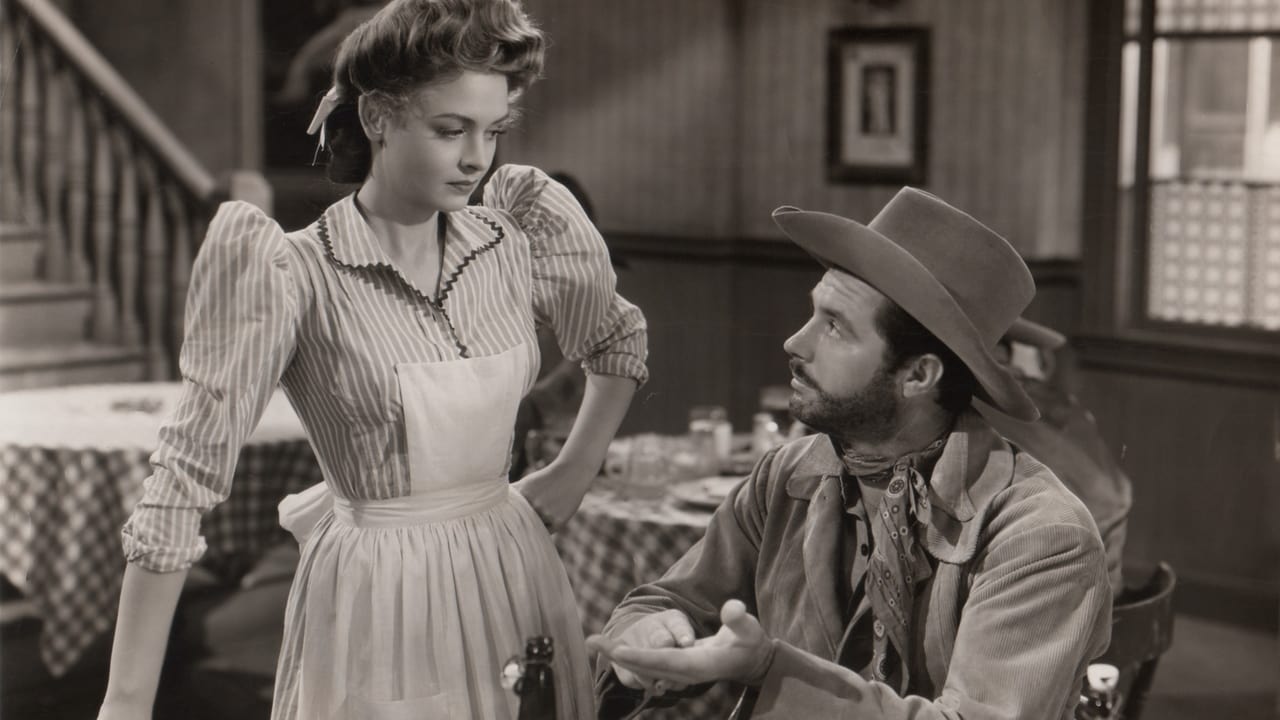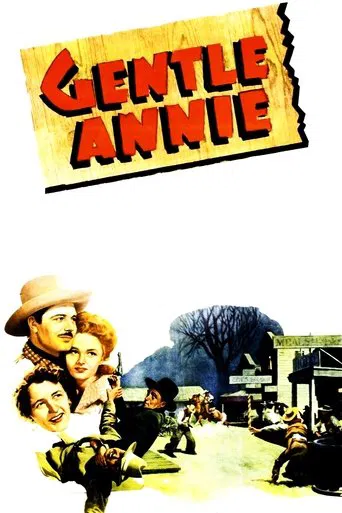

Copyright 1944 by Loew's Inc. A Metro-Goldwyn-Mayer Picture. New York opening: 4 May 1945. Official release date: 20 December 1944. 80 minutes. SYNOPSIS: On the trail of a train hold-up gang, an investigator (James Craig) finds himself caught in the middle of a feud between the matriarch of a pioneer family (Marjorie Main) and a crooked sheriff (Barton MacLane). Matters are further complicated when he falls in love with a former employee of the sheriff (Donna Reed) who has sought refuge with the family he suspects is behind the robbery. NOTES: W.S. Van Dyke was originally assigned to the movie but fell ill and was replaced by newly signed Metro-Goldwyn-Mayer contractee Andrew Marton (who had previously directed movies in Germany and England). It turned out to be Van Dyke's final fling behind the camera. He died on 5 February 1943. This movie was also one of the last film appearances of Noah Beery (senior) who has a small, unimportant role as a skinflint storekeeper.COMMENT:: An appealing little western, despite a hammy performance from Marjorie Main and the lumpish presence of James Craig. After a very lively action start, the movie goes backwards with a long and boring long-take monologue from Miss Main (doubtless Van Dyke's contribution), but then proceeds to make up for lost ground with the introduction of the agreeable duo, Henry "Harry" Morgan and Paul Langton. The talent line-up is soon completed by delightfully villainous Barton MacLane and his equally enjoyable thick-head heavy, Morris Ankrum. And then when Donna Reed hits her stride and gifted (if little- known) character actor, John Philliber, is thrust center-stage, we are truly in "B"-movie heaven. The hero's dilemma seems real enough as we plunge steadily towards the expected full-action climax with its clever resolution that anticipates several later films made with bigger budgets and lots more publicity. Director Andrew Marton not only keeps the action flowing fast, but fills the screen with movement. I am surprised that this effort didn't bring him to the immediate notice of studio executives. His talent seems to have been under-utilized by Metro-Goldwyn-Mayer, despite his later employment (with billing) as a second unit director on "King Solomon's Mines" and "Ben Hur".
... View MoreA turn of the (20th) century Western, set in Oklahoma, with several well known actors including James Craig, Donna Reed, Marjorie Main, Harry Morgan, Paul Langton, and Barton MacLane. Morris Ankrum and Noah Beery also appear. It's a better than average B movie that was directed by Andrew Marton with a screenplay by Lawrence Hazard that was based on a novel by MacKinlay Kantor.Three persons wearing sugar sacks with eye-holes rob a train of its bounty. Though the robbery is a success, brothers Cotton (Morgan) & Violet (Langton) Goss, and a third person thought to be an Indian, scorch much of the money when they blow the safe. Because there was mail on the train, U.S. Marshall Lloyd Richland (Craig) is in charge of catching the criminals. Richland doesn't trust the local Sheriff Tatum (MacLane), so he goes to town incognito, as a bum hitching a free ride on the train. Tatum, with his deputy (Ankrum), decides not to charge Rich Williams, the name Richland assumes, and releases him. In the local saloon/restaurant, Rich meets Violet and a high strung waitress Mary (Reed). A dispute between Tatum and Violet, also in the restaurant, leads to a fight in which Rich intervenes to keep the deputy from shooting Violet. Cotton enters and the three men (the Goss brothers & Rich) exit together with their guns drawn and backs to the door. Mary's had enough, so she quits and the four of them become fast friends. The Goss brothers invite Rich & Mary back to their ranch to spend the night.The Goss family matriarch is the title character, Annie (Main), who's also referred to as "Mud" or "Muddie" by her boys. She's a rough, but loving woman from the South who believes that stealing from a Northerner is O.K., though she's unawares that her sons robbed the train. Otherwise, she has raised her boys well: they're polite, respectful, giving, and will do anything to please their "Mud". She says what she really wants is to get back to Missouri, where they used to live. So, she and the boys haven't really put down roots, worked the farm much, or anything else to establish themselves in the community. Mary tells Annie she wants to get back to St. Louis (which is ironic, given that Main was in the film Meet Me in St. Louis (1944)), the same year as this one ... and it too is a turn of the century story), which endears her to Annie, who tells Mary she can stay as long as she wants. Rich takes all this in and doesn't want to believe that the Goss brothers are the ones who robbed the train, though he finds some evidence that they did. He helps the brothers run some unknown people (the Sheriff & his deputy) off their ranch that evening, and has earned their trust and friendship. Plus, a relationship develops between Rich and Mary, who also suspects the guilt of their hosts.There isn't much more to the film besides further development of the relationships between the characters. Tatum is shown to be corrupt, or at least of less than sterling character, while Rich wrestles with his fondness for the Goss family and his responsibilities, while falling in love with Mary. When the Goss brothers invite Rich to join him in robbing a train and show him the money from the previous job, he has no choice but to take them in. But, they get the drop on him until the three of them are needed to battle the greater foe, Tatum, who's just shot Annie.In the ensuing shootout, Violet is killed, as are the Sheriff and his deputy. The last scenes involve Rich putting Cotton on a train to be arraigned, promising to do his best to help him get a reduced sentence, and Mary deciding not to return to St. Louis, but instead stay with Rich.
... View MoreMarjorie Main is the title character. This is a Western, basically. But with Main as the lead, it doesn't really feel like one. We already know her as the proprietor of the dude ranch in "The Women" -- hardly a Western -- and (though it came later) as Ma Kettle.I liked Westerns when I was a child but don't care for them now. Many still do. I think this movie would please the two camps about equally.It's psychologically quite odd, if watered-down: Main's two sons adore her. And one of them is named Violet. OK.James Craig is an outsider in town and a central figure in the plot. He was a handsome an underrated actor of this period. I sometimes wonder why certain careers, such as his, didn't take off.Donna Reed, too, is an outsider. She was very appealing in movies of the 1940s. This one is no exception.Who knows if it was intentional but the movie is, looking at it now, a little campy. We have the son named Violet. And Main's dog is named Belle. True, she is a daughter of the Confederacy. But it's kind of a grand name for a rancher to give her mongrel dog.
... View MoreThis is a great drama, that just happens to be a western. Craig is the marshal that must decide whether he should arrest the family that has treated him so well. This is yet another grand story from the pen of MacKinlay Kantor (Outlaw Territory, 1953/Gun Crazy, 1950). Each character is carefully developed, and, by the climax we really feel the injustice of 'the system.' Morgan shows once again, that earlier in his career he was Oscar material. Keep the kleenex handy, if you can find this one on video or TV you'll need them.
... View More